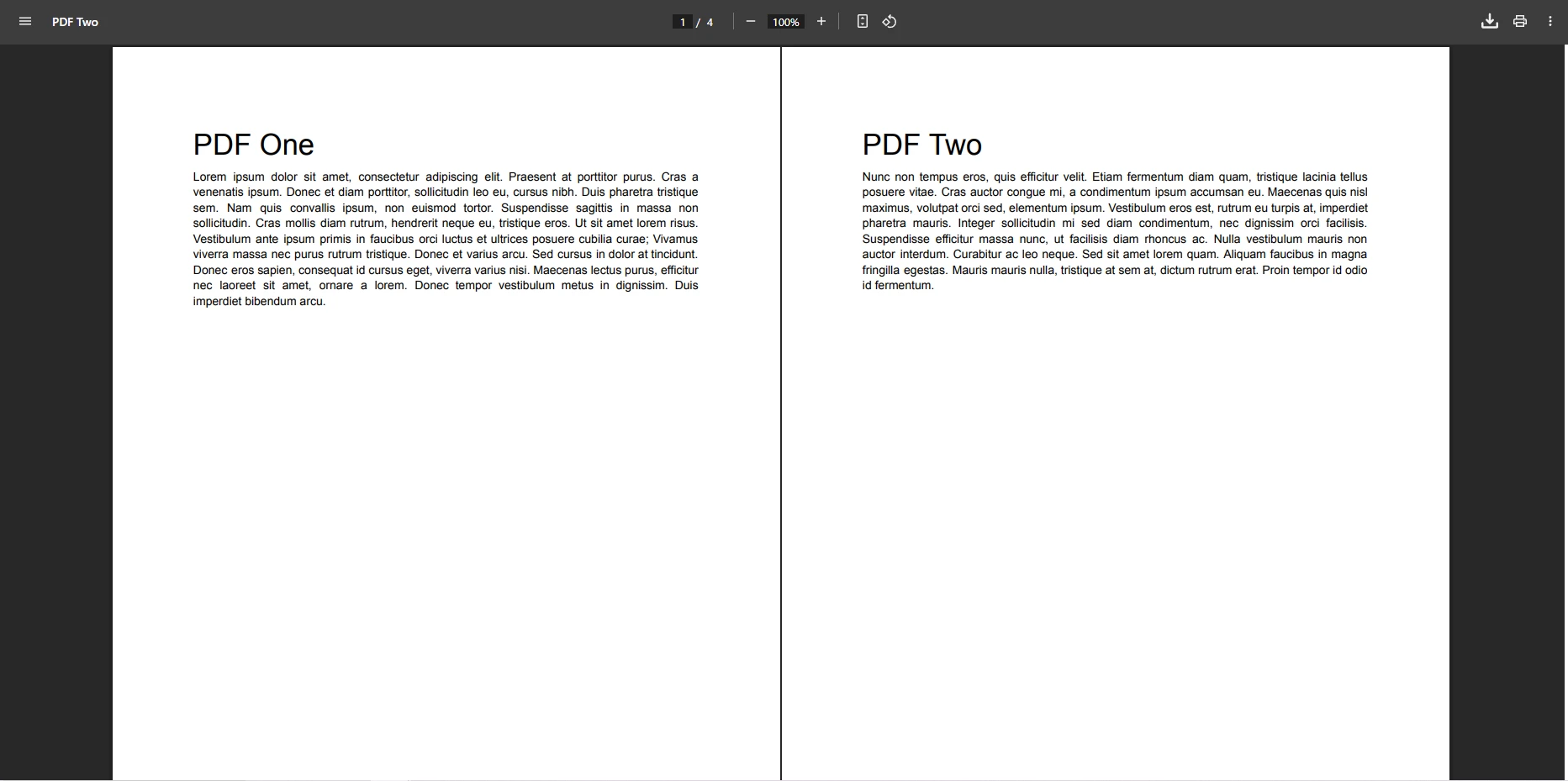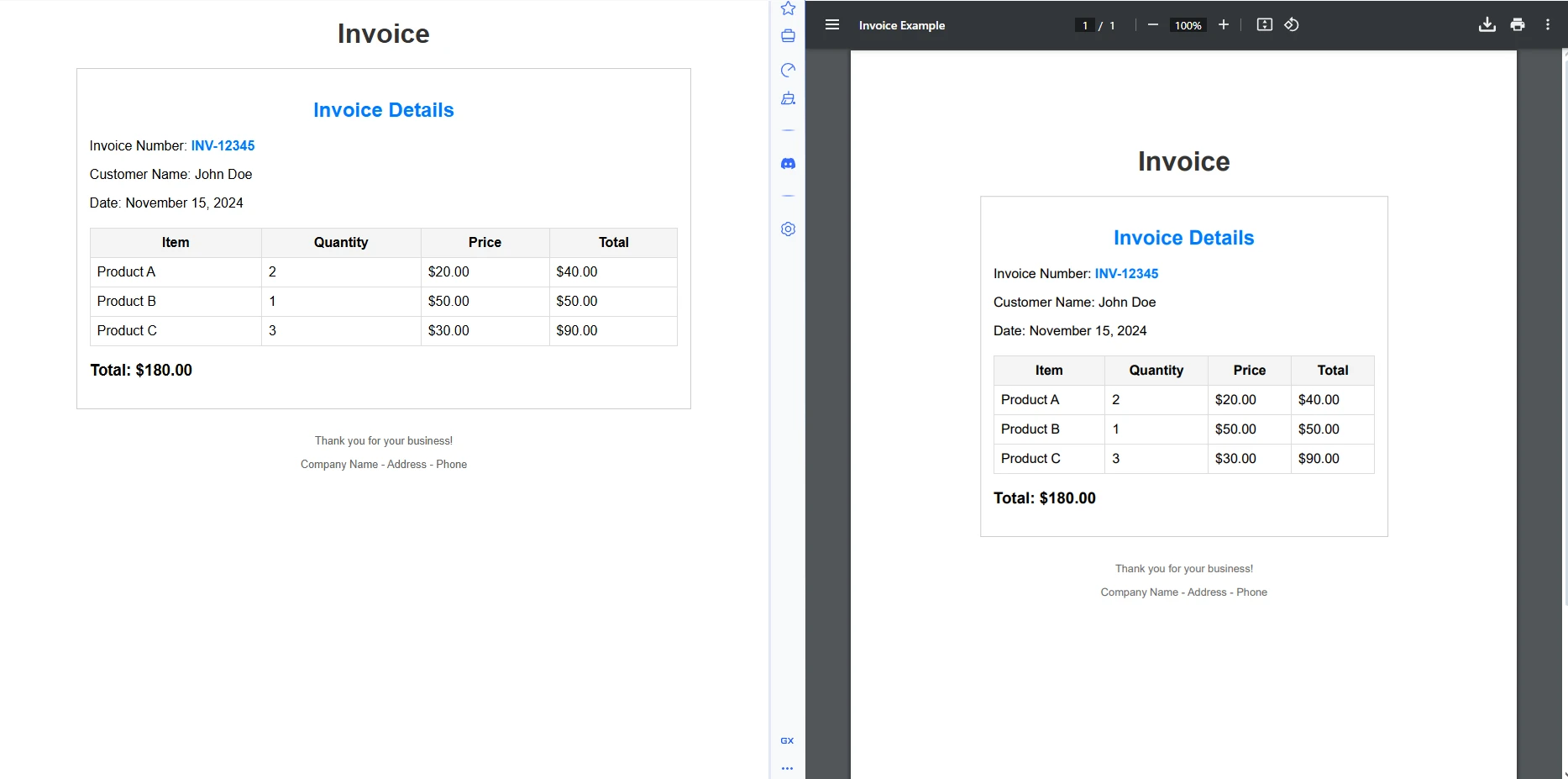How to Get a PDF Page Count in C#
Getting a PDF page count in C# is straightforward with IronPDF. Simply use PdfDocument.FromFile("file.pdf").PageCount to retrieve the total number of pages from any PDF file in a single line of code.
While obtaining the page count from a PDF might not be exciting, it's crucial for building reliable applications. Whether you're managing a document management system, calculating printing costs, or generating reports, knowing the total page count is essential. It can mean the difference between a smooth process and a validation issue.
The good news is that IronPDF makes this process incredibly simple, requiring just a few lines of code. In this article, you'll learn how to use IronPDF to get the page count from any PDF file, allowing you to focus on more important tasks.
How Do I Get PDF Page Count Quickly?
Here's how to get the page count from a PDF file using IronPDF:
using IronPdf;
using System;
class Program
{
static void Main(string[] args)
{
// Load an existing PDF document
PdfDocument pdf = PdfDocument.FromFile("MultiPageDocument.pdf");
// Get the page count - it's this simple!
int pageCount = pdf.PageCount;
// Display the result in the console
Console.WriteLine($"The PDF has {pageCount} pages");
}
}using IronPdf;
using System;
class Program
{
static void Main(string[] args)
{
// Load an existing PDF document
PdfDocument pdf = PdfDocument.FromFile("MultiPageDocument.pdf");
// Get the page count - it's this simple!
int pageCount = pdf.PageCount;
// Display the result in the console
Console.WriteLine($"The PDF has {pageCount} pages");
}
}This code demonstrates the core functionality: load a PDF and read its page count through the PageCount property. The method returns an integer representing the number of pages. You can easily add this snippet to any C# project, whether it's a Windows application, web service, or Azure Function.
For advanced scenarios, you might want to combine page counting with other PDF operations. For example, you could extract text from specific pages, add watermarks based on page count, or split PDFs at certain intervals.
What Does the Input PDF Look Like?
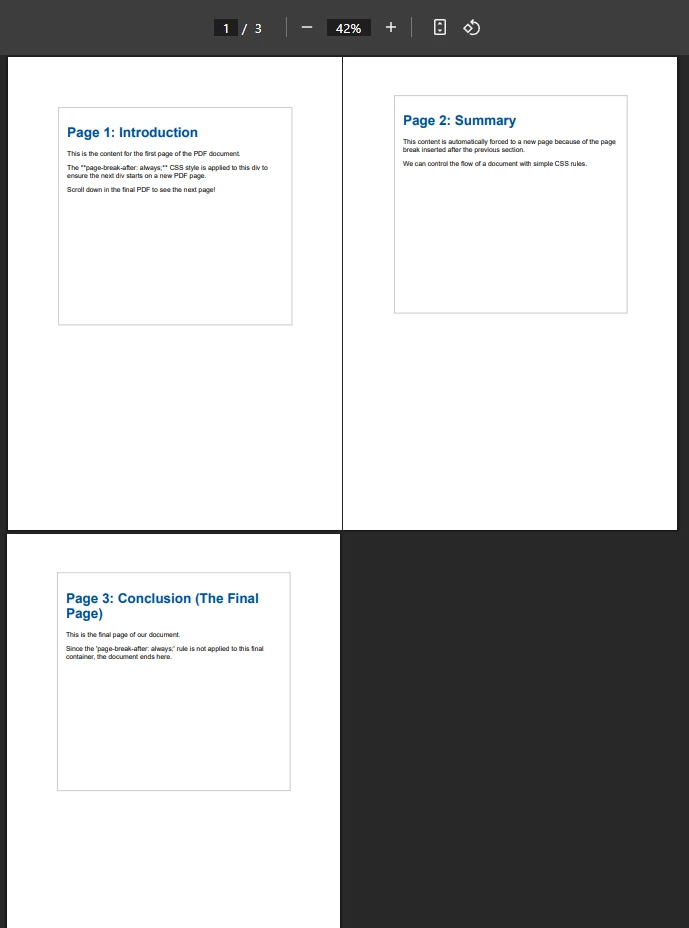
What Output Should I Expect?
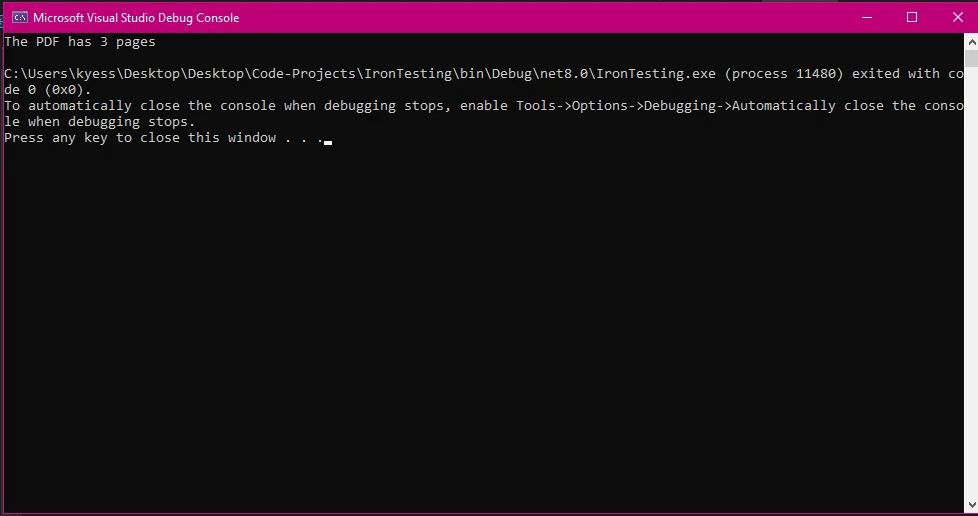
How Do I Set Up IronPDF in Visual Studio?
Before you can start counting PDF pages, you'll need to install IronPDF via NuGet. Follow these steps:
- Open your project in Visual Studio
- Right-click on References in Solution Explorer
- Select "Manage NuGet Packages"
- Search for "IronPdf" and click Install
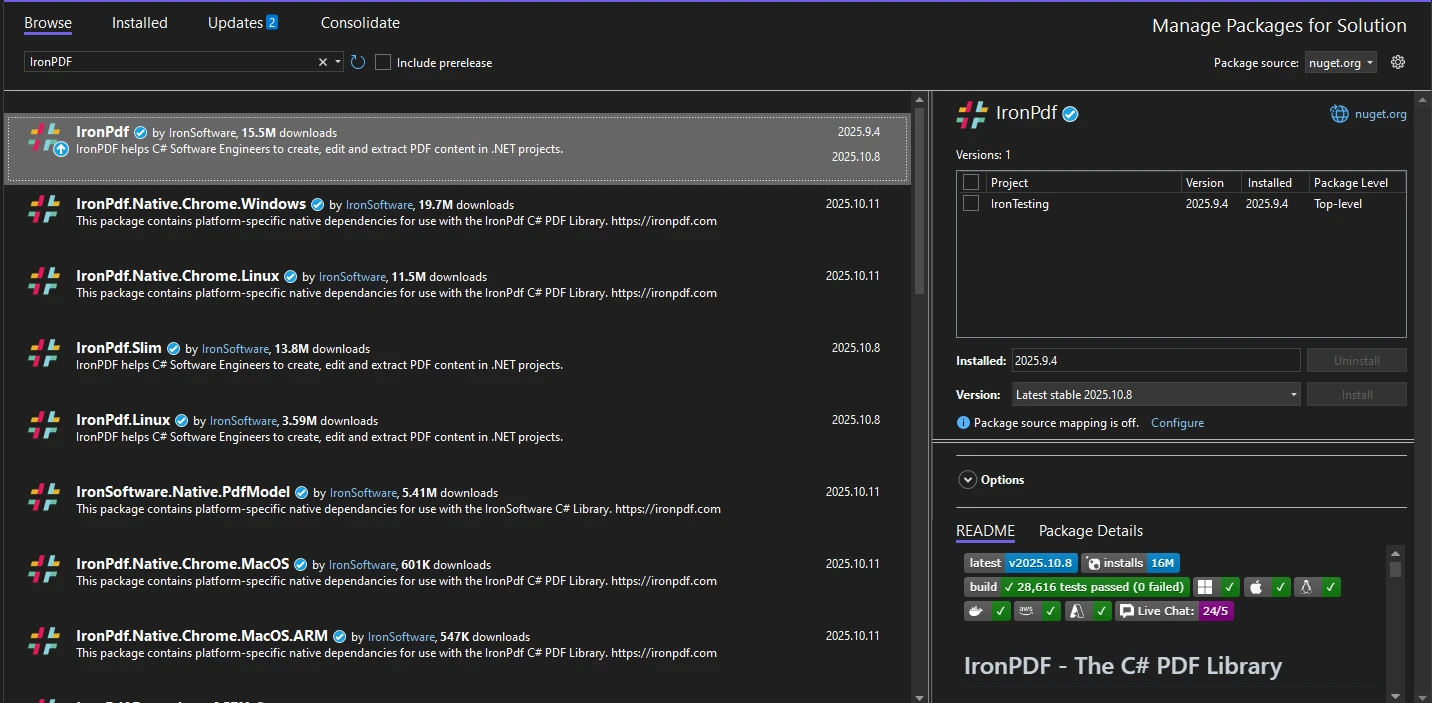
var pageCount = PdfDocument.FromFile("document.pdf").PageCount;var pageCount = PdfDocument.FromFile("document.pdf").PageCount;Once installed, you're ready to work with PDF files. IronPDF supports .NET Framework 4.6.2+, .NET Core 3.1+, and .NET 5+, providing broad compatibility for your applications. The library works smoothly on Windows, Linux, and macOS platforms. For detailed setup instructions, check the IronPDF installation guide.
How Can I Work with Different PDF Sources?
How Do I Count Pages from Local Files?
The most common scenario involves counting pages from PDF files stored on your system. According to Stack Overflow discussions, IronPDF offers one of the cleanest APIs for this purpose:
using IronPdf;
using System;
using System.IO;
public class PdfPageCounter
{
public static void CountPagesFromFile()
{
string filePath = @"C:\Documents\invoice.pdf";
// Check if file exists before opening
if (File.Exists(filePath))
{
// Create a new PdfReader instance (conceptually similar to var reader)
PdfDocument document = PdfDocument.FromFile(filePath);
// Access the page count property
int numberOfPages = document.PageCount;
// Output the information provided
Console.WriteLine($"Document pages: {numberOfPages}");
// Close the document when done
document.Dispose();
}
}
}using IronPdf;
using System;
using System.IO;
public class PdfPageCounter
{
public static void CountPagesFromFile()
{
string filePath = @"C:\Documents\invoice.pdf";
// Check if file exists before opening
if (File.Exists(filePath))
{
// Create a new PdfReader instance (conceptually similar to var reader)
PdfDocument document = PdfDocument.FromFile(filePath);
// Access the page count property
int numberOfPages = document.PageCount;
// Output the information provided
Console.WriteLine($"Document pages: {numberOfPages}");
// Close the document when done
document.Dispose();
}
}
}This example shows proper file handling with an exists check and resource disposal. The PdfDocument instance provides immediate access to the page count without parsing the entire file. The library doesn't require complex xref or trailer parsing - it handles these PDF internals automatically. When a file isn't found, the code avoids null reference exceptions with proper checking.
You can extend this functionality to work with encrypted PDFs, PDF/A compliant documents, or even compressed PDFs. IronPDF handles all these formats transparently.
How Do I Count Pages from URLs?
IronPDF can also handle PDF files directly from web URLs. This feature is particularly useful when working with remote documents stored on cloud platforms or content delivery networks. Learn more about URL to PDF conversion:
using IronPdf;
public class WebPdfCounter
{
public static void CountPagesFromUrl()
{
// Download and open PDF from URL
var reader = PdfDocument.FromUrl(new Uri("___PROTECTED_URL_61___"));
// The page count is immediately available
int pages = reader.PageCount;
Console.WriteLine($"Web PDF contains {pages} pages");
}
}using IronPdf;
public class WebPdfCounter
{
public static void CountPagesFromUrl()
{
// Download and open PDF from URL
var reader = PdfDocument.FromUrl(new Uri("___PROTECTED_URL_61___"));
// The page count is immediately available
int pages = reader.PageCount;
Console.WriteLine($"Web PDF contains {pages} pages");
}
}This approach works well with documents hosted on Azure Blob Storage, SharePoint, or any accessible web server. IronPDF handles the download process internally, managing HTTP headers and authentication when needed.
What Results Will URL Processing Show?
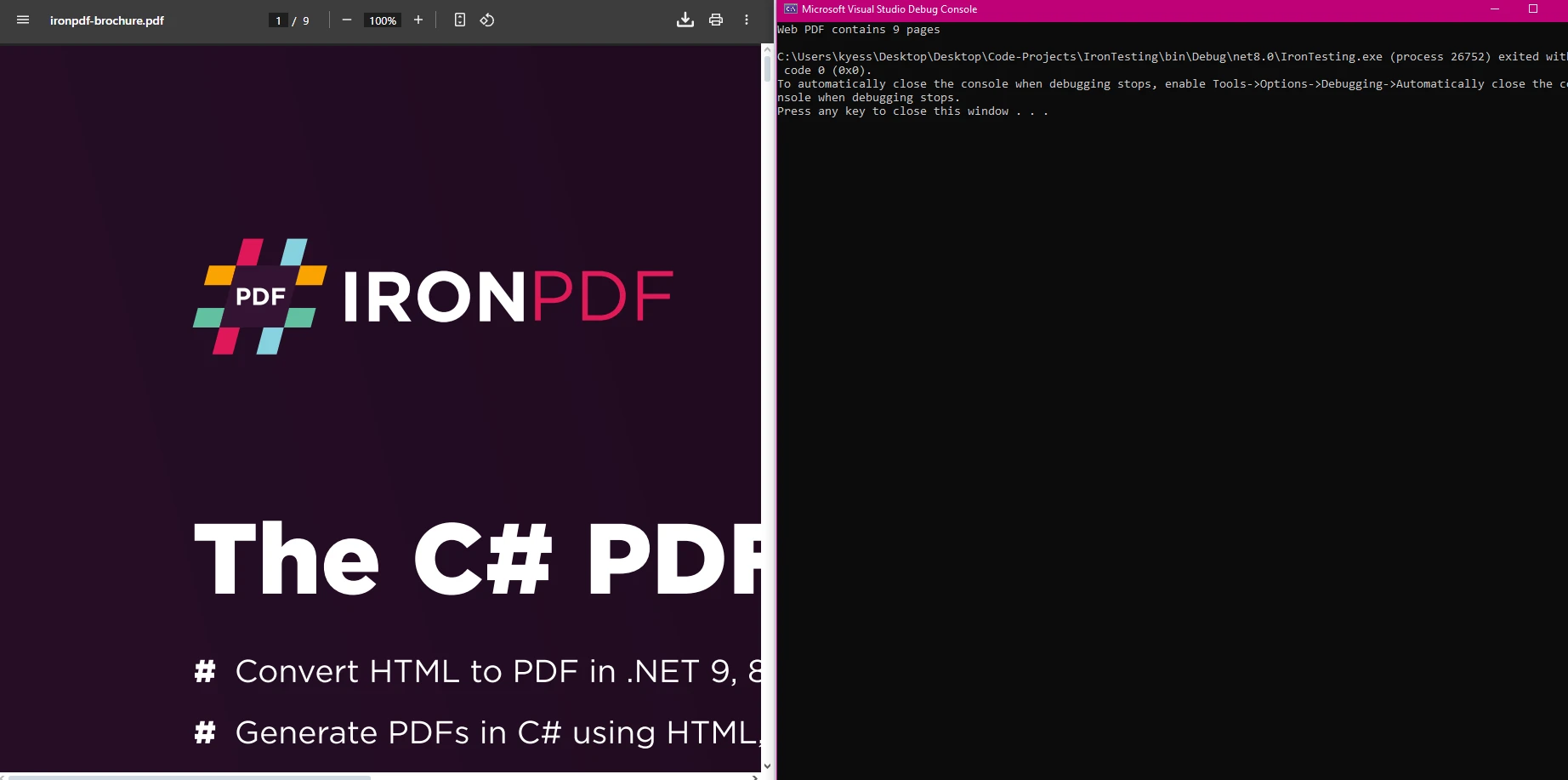
How Do I Batch Process Multiple PDF Files?
When dealing with multiple PDF files, you can efficiently process them in a loop. This approach is familiar to developers who work with file systems:
using IronPdf;
using System;
using System.IO;
public class BatchProcessor
{
public static void ProcessMultiplePdfs(object sender, EventArgs e)
{
string[] pdfFiles = Directory.GetFiles(@"C:\PDFs", "*.pdf");
foreach (string file in pdfFiles)
{
try
{
// Open each PDF file
using (var pdf = PdfDocument.FromFile(file))
{
// Get the page count for this document
int count = pdf.PageCount;
// Extract just the filename for display
string fileName = Path.GetFileName(file);
// Output the result on a new line
Console.WriteLine($"{fileName}: {count} pages");
// Could save results or post to database here
}
}
catch (Exception ex)
{
// Continue processing other files if one fails
Console.WriteLine($"Error processing {file}: {ex.Message}");
continue; // Use break only if you want to stop entirely
}
}
}
}using IronPdf;
using System;
using System.IO;
public class BatchProcessor
{
public static void ProcessMultiplePdfs(object sender, EventArgs e)
{
string[] pdfFiles = Directory.GetFiles(@"C:\PDFs", "*.pdf");
foreach (string file in pdfFiles)
{
try
{
// Open each PDF file
using (var pdf = PdfDocument.FromFile(file))
{
// Get the page count for this document
int count = pdf.PageCount;
// Extract just the filename for display
string fileName = Path.GetFileName(file);
// Output the result on a new line
Console.WriteLine($"{fileName}: {count} pages");
// Could save results or post to database here
}
}
catch (Exception ex)
{
// Continue processing other files if one fails
Console.WriteLine($"Error processing {file}: {ex.Message}");
continue; // Use break only if you want to stop entirely
}
}
}
}This code iterates through all PDF files in a directory, providing the page count for each. The using statement ensures proper resource cleanup, preventing memory issues. You can extend this to import data into databases or generate reports. This approach provides visibility into your document collection. For more examples, visit the IronPDF code examples.
For high-performance scenarios, consider using async operations or parallel processing to handle multiple files simultaneously. This can significantly reduce processing time for large collections.
What Does Batch Processing Output Look Like?

What Are the Real-World Applications?
The ability to quickly obtain page counts enables numerous practical applications:
- Document Management: Organize files by size for content management systems
- Print Cost Calculation: Estimate costs using print functionality
- Upload Validation: Check limits in web applications
- Report Generation: Include statistics in summary reports
- Quality Control: Verify requirements for PDF/A compliance
These use cases show the value of efficient page counting in production systems. The information helps you make informed decisions about document processing. Microsoft's documentation on PDF handling provides additional context for file operations in .NET.
Consider integrating page counting with other IronPDF features like OCR text extraction, form field detection, or digital signature verification to build complete workflows.
What Performance Factors Should I Consider?
IronPDF excels at page count retrieval because it reads PDF metadata rather than parsing entire documents. This ensures fast response times even with large files. The library uses efficient memory management, making it suitable for production environments where performance matters.
When processing numerous PDF files, follow these best practices:
- Use using statements for automatic resource disposal
- Process files in batches to manage memory
- Implement error handling for corrupted files
- Close documents after reading to free resources
- Consider memory stream operations
- Use Docker containers for scaling
The simplicity of IronPDF's API means less time spent on implementation. Its design efficiency makes it ideal for high-volume processing. Thanks to these optimizations, you can handle thousands of PDFs without performance issues. For detailed performance guidance, check the IronPDF performance assistance guide.
Purchase a license to reveal IronPDF's full potential for enterprise applications.
What Common Issues Should I Watch For?
How Do I Handle Corrupted PDF Files?
If a PDF file is corrupted, IronPDF will throw an exception. Always wrap your code in try-catch blocks when dealing with user-uploaded files. This is common when processing documents from various sources. You can resolve this by validating files before processing. Proper error handling prevents application crashes. The library's internal checks can identify corrupted content automatically.
For advanced error handling, implement custom logging to track problematic files. You might also want to sanitize PDFs to remove potentially harmful content before processing.
What About Access Permission Issues?
Ensure your application has read permissions for the PDF files you're accessing. This is particularly important for web applications and services. Write permissions may be needed if you plan to save modifications. Check the IronPDF troubleshooting guide for detailed solutions.
When deploying to Azure or AWS, ensure your application has necessary permissions to access storage services. Consider using environment variables for secure credential management.
How Can I Improve Memory Usage?
For applications processing many PDFs, dispose of PdfDocument objects promptly to prevent memory leaks. This optimization is crucial for long-running services. Include proper disposal in your XAML code-behind or controller actions. Remember that performance depends on proper resource management in your code.
Consider implementing garbage collection strategies for batch processing scenarios. For server applications, monitor memory usage and implement appropriate limits to prevent out-of-memory exceptions.
What Are the Key Takeaways?
IronPDF simplifies getting PDF page counts in C#. With its intuitive API, you can extract page information from local files, URLs, and encrypted documents with minimal code. The library's efficiency and reliability make it ideal for both simple scripts and complex enterprise systems.
IronPDF's complete features and excellent support help you implement PDF page counting functionality quickly and reliably. Whether you're building a document management system or validating PDF uploads, IronPDF provides the tools you need. The result is cleaner code, faster development, and more reliable applications.
The library integrates seamlessly with modern .NET applications, supporting Blazor, MAUI, and ASP.NET Core. Its cross-platform compatibility ensures your page counting functionality works consistently across environments.
Start with a free trial today and experience what makes IronPDF the preferred choice for .NET developers worldwide. Post your questions in the comments or contact support for assistance.
Frequently Asked Questions
How can I get the page count of a PDF document using C#?
You can use IronPDF in C# to easily get the page count of a PDF document. IronPDF provides straightforward methods to access the total number of pages in a PDF file, making it an essential tool for document management systems and reporting.
Why is getting the page count from a PDF important?
Knowing the page count of a PDF is crucial for various applications such as document management systems, calculating printing costs, and generating accurate reports. It ensures smooth operations and prevents file validation issues.
What are some common applications that require knowing the PDF page count?
Common applications include document management systems, print services for calculating costs, and software that generates and verifies reports. Accurate page counts are crucial for these operations.
Does IronPDF support counting pages in any PDF document?
Yes, IronPDF supports counting pages in any PDF document, offering developers a reliable and efficient way to manage PDF files in their applications.
Can IronPDF handle large PDF files when counting pages?
IronPDF is designed to handle large PDF files efficiently, ensuring that page count operations are quick and reliable, even for documents with a high number of pages.
Is there a step-by-step guide for counting PDF pages using IronPDF?
Yes, IronPDF provides a step-by-step guide with code examples to help developers seamlessly integrate PDF page count functionality into their C# applications.
.NET 10 Support: Is IronPDF compatible with .NET 10 for counting PDF pages?
Yes. IronPDF is fully compatible with .NET 10 and supports getting the page count using its `PdfDocument.PageCount` property in .NET 10 projects, just as it does in .NET 5, 6, 7, 8, and 9. (ironpdf.com)
.NET 10: Can I use IronPDF’s page count functionality in async .NET 10 environments?
Yes. In .NET 10 environments, IronPDF supports the same PDF page count methods synchronously and asynchronously, ensuring developers can integrate page count logic in both blocking and non-blocking workflows without compatibility issues.



